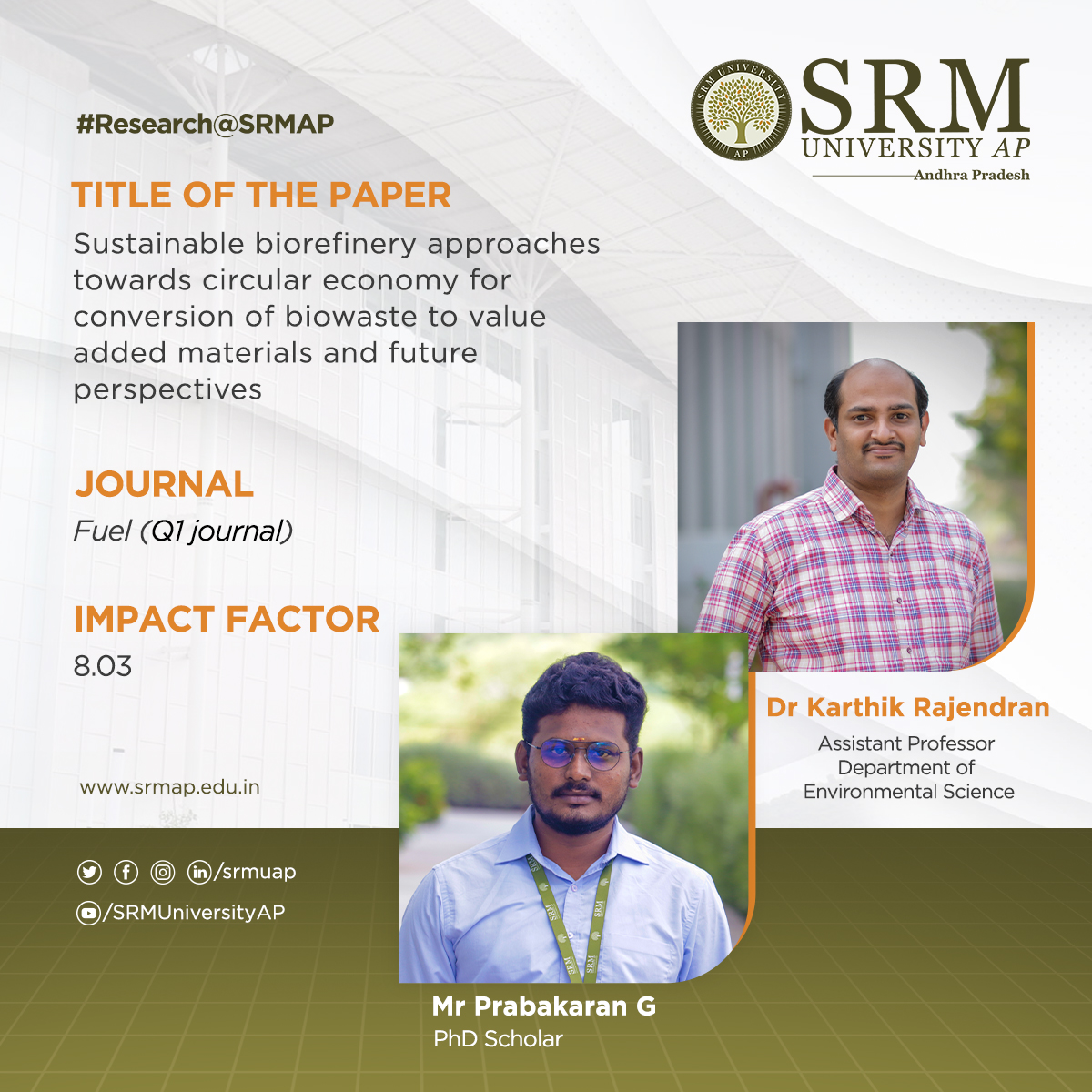 Worldwide, 1.3 billion tons of bio-waste are generated annually. By 2025, this is predicted to be increased by 2.2 billion tons/year. The emerged biowaste biorefinery has proved as a sustainable approach for integrated bioproducts, such as bioenergy, biopolymers, biochemicals, bioplastics, and biofertilizers further used for industrial, commercial, agricultural, and energy applications. Integrating biorefinery concepts into biowaste management is promising for a circular bioeconomy. Recent research at the Department of Environmental Sciences investigates the potential of sustainable biorefinery approaches. Assistant professor Dr Karthik Rajendran and his PhD scholar Mr. Prabakaran G published a paper, Sustainable biorefinery approaches towards circular economy for conversion of biowaste to value added materials and future perspectives, in Fuel, a Q1 journal, with an impact factor of 8.03. For this paper, they have collaborated with Dr Mukesh Kumar Awasthi from the College of Natural Resources and Environment, Northwest A&F University, China.
Worldwide, 1.3 billion tons of bio-waste are generated annually. By 2025, this is predicted to be increased by 2.2 billion tons/year. The emerged biowaste biorefinery has proved as a sustainable approach for integrated bioproducts, such as bioenergy, biopolymers, biochemicals, bioplastics, and biofertilizers further used for industrial, commercial, agricultural, and energy applications. Integrating biorefinery concepts into biowaste management is promising for a circular bioeconomy. Recent research at the Department of Environmental Sciences investigates the potential of sustainable biorefinery approaches. Assistant professor Dr Karthik Rajendran and his PhD scholar Mr. Prabakaran G published a paper, Sustainable biorefinery approaches towards circular economy for conversion of biowaste to value added materials and future perspectives, in Fuel, a Q1 journal, with an impact factor of 8.03. For this paper, they have collaborated with Dr Mukesh Kumar Awasthi from the College of Natural Resources and Environment, Northwest A&F University, China.
Biorefinery is designed to improve the economic potential and achieve a circular bioeconomy by integrating various technologies such as pyrolysis, anaerobic digestion, gasification, incineration, and aerobic composting to gain energy, nutrients, and material recovery. Biowaste biorefinery contributes as a driving force to cope with challenges of resource scarcity, climate changes, and increased demand. The sustainable biorefinery approaches toward circular bioeconomy require a comprehensive understanding of the biowaste across the value chain. Based on the carbon neutralized biowaste biorefinery concept, this paper explained biowaste generation and utilization as a renewable resource through biorefinery techniques from the perspective of energy, nutrients, and material recovery. Meanwhile, clarify the implementation status, public engagement, and prospects of biowaste recycling with the central concept of biorefinery circular bioeconomy.
Abstract
With the colossal energy demand inevitably exacerbating the non-renewable resources depletion and ecological-social challenges, renewable energy has become a crucial participant in sustainable strategy. Biorefinery emerged as a sustainable approach and recognized promising transformation platforms for products to achieve a circular bioeconomy that focuses on biomass efficiency and sustainable valorisation, promotes resource regeneration, and restorative. The emerged biowaste biorefinery has proved as a sustainable approach for integrated bioproducts and further applied this technology in industrial, commercial, agricultural, and energy sectors. Based on carbon-neutral sustainable development, this review comprehensively explained biowaste as renewable resource generation and resource utilisation technologies from the perspective of energy, nutrient, and material recovery in the concept of biorefinery. Integrating biorefinery concepts into biowaste management is a promise for the conversion of biowaste into value-added materials. It contributes as a driving force to cope with resource scarcity, climate changes, and huge material demand in a circular bioeconomy. In practice, the optimal of biorefinery technologies depends on environmentally friendly, economic and technical feasibility, and social and policy acceptance. Additionally, policy interventions are necessary to promote biowaste biorefinery implements for a circular bioeconomy and contribute to a low-carbon cleaner environment.

